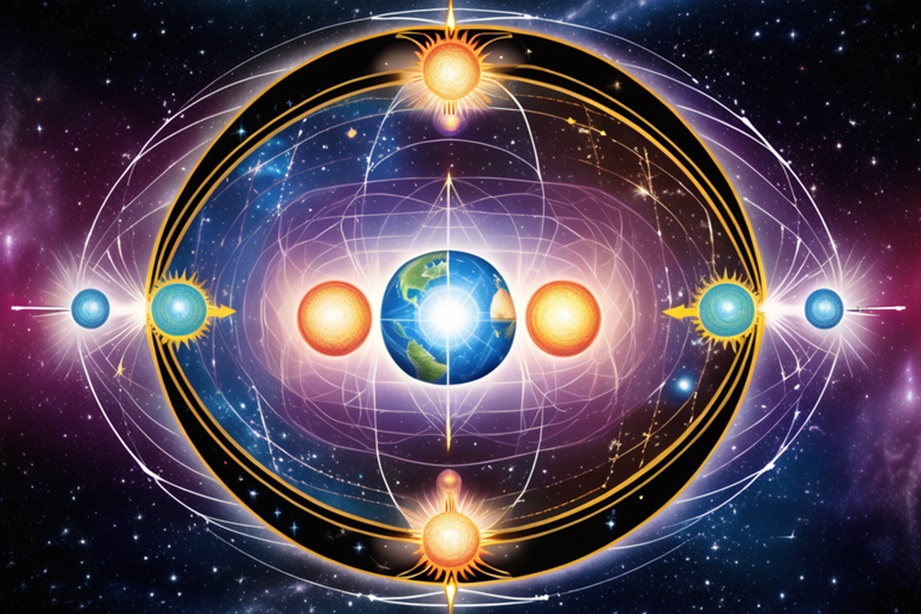We are constantly creating worlds for ourselves – that’s our thing, that’s what we do. We might of course think that it is ‘things in the world’ that we are making, not worlds, but when we make worlds we don’t know that this is what we’re doing. It’s because we don’t know that we are making worlds that we get so very stuck in them. Another way of putting this is to say that we get stuck because we invent limitations and then believe in them. Worlds have to be limited, as James Carse says here:
A finite game occurs within a world. The fact that it must be limited temporally, numerically, and spatially means that there is something against which the limits stand. There is an outside to every finite game. Its limits are meaningless unless there is something to be limited, unless there is a larger space, a longer time, a greater number of possible competitors.
When we talk about ‘making a world’ that sounds rather good – when this is said it is usually meant to denote something pretty spectacular, pretty amazing – but the truth of the matter is very different. Worlds restrict us, as we have said, and – moreover – they restrict us without us knowing that we’ve been restricted, which is a more peculiar thing than we might at first realize. When we are restricted without being able to know that we are then we don’t feel restricted (or hemmed in) at all and yet we absolutely are. Our perception of being free is an hallucination – the truth of our situation has now become very different from our perception of it. The truth of our situation has become invisible to us; the information we need is unavailable to us – we simply can’t access it, or know that it is there to be accessed, if we somehow could. It isn’t information in the sense of data that we’re talking about here though, but information in the sense of Perspective.
What we’re actually talking about here is entropy, therefore. Entropy is ‘the lack of perspective that can’t know itself as a lack’. Entropy is the situation where we can’t see the truth and don’t know that we can’t. Entropy is the ‘occlusion of the Truth’. This statement comes across as being somewhat shocking from the point of view of a classical education in thermodynamics – we don’t ever speak about something called ‘the Truth’ in the physical sciences, needless to say. We can talk about information (which can be scientifically defined), but certainly not something as nebulously metaphysical as ‘the Truth’. Yet is ‘the Truth’ that we’re talking about here and nothing else – we’re not talking about the behaviour of molecules but that of human beings and what is important (whether we realize it or not) to us human beings the metaphysical truth of our situation, however nebulous that term might seem to be.
This thing that we are calling ‘the Truth’ (or Perspective-with-a-capital-P) is what we are busy doing our dance with; even if our interest in the truth is purely we should not ever see it we are still doing a dance with it – not a very graceful dance it is true, but a dance all the same. Denial is never graceful! We can object that ‘the Truth’ isn’t scientifically verifiable phenomenon in that it can’t ever be defined but this argument is ridiculous – of course the Truth can’t be ‘defined’ (which is to say, put in a box that is made of words or thoughts) but that doesn’t make it any less ‘true’. That’s actually how we know it to be true. Anything we can define is part of our system of lies… We are used to thinking about physical systems in terms of entropy and in terms of the laws of thermodynamics but when it is ourselves that we are talking of (rather than a beaker of hot fluid sitting on a bench in a laboratory, or a mechanical engine of some kind) then it makes more sense to say that ‘Entropy is an occlusion of the Truth’ rather than saying that it is ‘unavailable information’, which sounds reassuringly scientific but which fails to do justice to what we’re talking about. A mythological, not a technical language is what is needed here – it’s not as if we actually know what we’re talking about here, after all!
Entropy, in psychological terms, can best be explained by saying that it is the situation where we are restricted to an unreal world of our own making, but don’t know that we are. Our ‘restrictedness’ is invisible to us; the truth of our situation is invisible to us, inaccessible to us, unsuspected by us. The truth, when excluded, creates strange shadows and these shadows make up the worlds that we live in. The shadow worlds that we live in don’t look like ‘shadow worlds’, they just they just look normal to us, they don’t look in any way different to how we would expect them to look, to how we think honest-to-goodness reality ought to look. We don’t see anything wrong, in other words. It’s not that there’s something ‘wrong’ in any metaphysical sense, simply that there is a ‘wrongness’ in the sense of an ‘invertedness’ that we can’t see. There’s a glitch that’s hidden deep in the heart of things.
The ‘shadow worlds’ of which we speak are ‘inverted’ because when we are adapted to them then we look at everything as if restriction were the key principle of reality of reality rather than openness. Another way of putting this is to say that we are in these worlds making the assumption that it is the boundaries that make up reality rather than ‘that which is being bounded’, which is a perverse view. ‘That which is being bounded’ is disregarded by us; we have no interest in it. Our lack of interest in whatever it is that is being bounded is absolute. What we’re saying here is simply that we are interested in what has been ‘defined’ but not at all interested in what ‘hasn’t been defined,’ or what is ‘incapable of being defined’. This might sound fair enough to us – upon first hearing – but the rub is that what can be defined as unreal whilst reality itself – as we have just said – is by its very nature indefinable. The type of ‘meaning’ we are orientated towards is ‘defined meeting’, even though ‘defined meaning’ ultimately equals ‘no meaning’; open or undefined meaning, although it is the only genuine type of meaning, is meaningless as far as we’re concerned and we don’t tune into it at all. We have no connection with it.
This talk of ‘defined meaning versus open meaning’ might sound rather obscure but it’s actually very straightforward – defined meaning is the meaning of our positive statements about reality, our thoughts, in other words. Open meaning – on the other hand – is the ‘meaning’ that we perceive to be in the world when we aren’t projecting our own ‘defined meaning’ upon it. Is the world really what I say it is, or is there perhaps a just little bit more to it than this? If we agree to consider the possibility that there might be more to the world than the meaning that we ourselves give it (and this doesn’t seem like too unreasonable a suggestion!) then this ‘meaning that the world has all by itself’ is what we call ‘open meaning’, which we can also call intrinsic meaning. This isn’t meaning in the sense that we can say what it means, or know what it means (which would be extrinsic meaning or ‘the meaning that our thoughts give the world) but it is nevertheless meaningful, albeit in a very different sense of the word. This is, after all, ‘nature speaking for herself,’ as opposed to us speaking for her. It I the meaning the world has in itself – imponderable though this might be – versus the meaning we ‘place upon it’ or ‘assign’ it. Which of these – we might ask – is going to be the most interesting or the most fruitful therefore? Clearly it has to be the former since there’s never anything going to be anything new in extrinsic or assigned meaning. How can there ever be anything new in extrinsic meaning, when it is we ourselves who are assigning it?
Entropy is what creates worlds for us to get trapped in. We create them without knowing that this is what we’re doing and so we might as well say that it is our ignorance that creates them. Our ignorance compels us in everything we do; entropy compels us in everything we do. Entropy is what shadow worlds are all about. Entropy is created by the act of us focusing on intrinsic meaning at the expense of intrinsic meaning, by us focusing on definite statements at the expense of what is not stated, and can never be stated. What is not stated as the truth; what is definitely positively stated on the other hand is always untrue. The ‘stated truth’ – we might say – is always untrue because the only way to get it to seem to be true is by covering up (or excluding) what is really true, which is by its very nature ‘unspeakable’ or ‘inexpressible’. This is the principle of the Negative Way, the Via Negativa.
We can relate the above to what James Carse says about ‘nature having no voice’ –
Nature is the realm of the unspeakable. It has no voice of its own and nothing to say. We experience the unspeakability of nature as its utter indifference to human culture.
Nature has no voice of its own because it has nothing to say and the reason it has nothing to say because there is nothing to say. It’s what hasn’t been said, rather than what has, that counts. Whatever is said is untrue – as soon as we say it it becomes untrue. We can only say what we say by excluding the Truth, as we have already said. Whatever it is that we say only makes sense if we block out the Truth (or if we give away our sense of Perspective) – whatever it is that we say (or whatever it is that has been said) only makes sense when the truth of the matter has been wholly eliminated from the picture and that is why we can say that ‘the positive world is created by entropy’, or that ‘this world is a shadow, the shadow that is produced by us standing in front of the Truth and saying that we’re not…’






